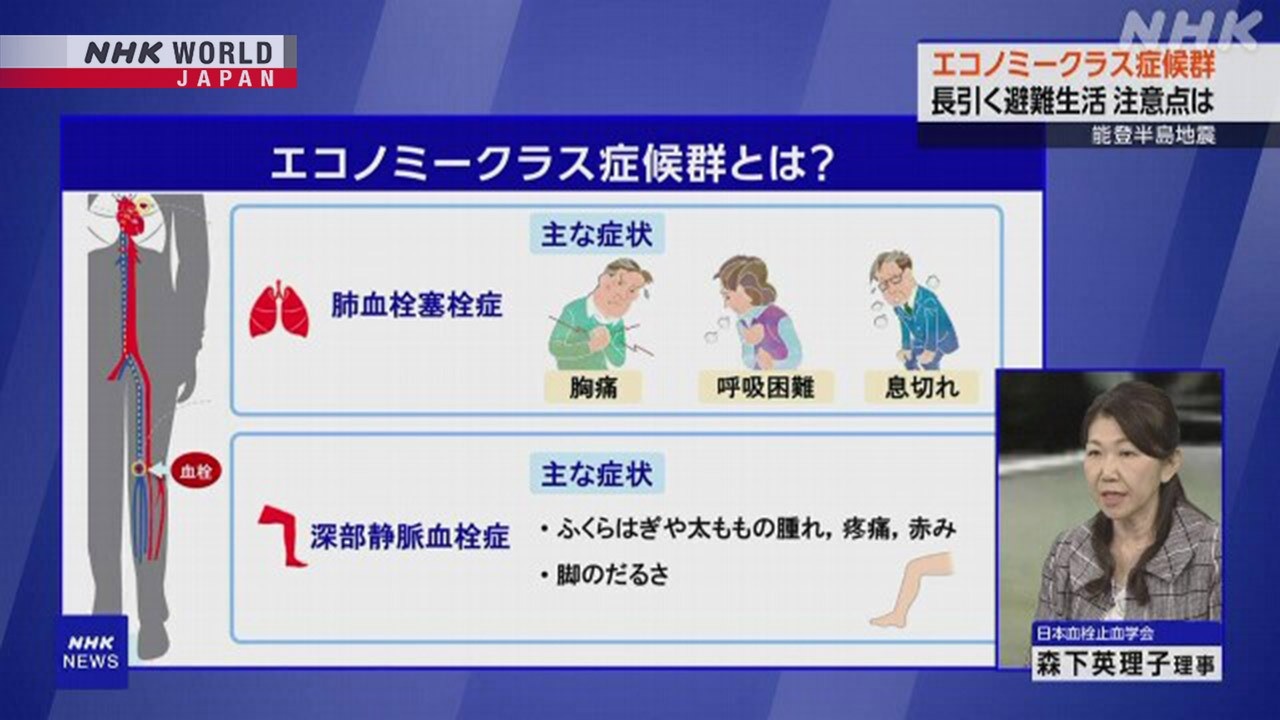"Disaster Evacuees at Risk of "Economy Class Syndrome""
Welcome to "Learn Japanese from the News." In this program we learn Japanese and more about Japan from news stories presented in simple Japanese. Today's headline is "Disaster Evacuees at Risk of "Economy Class Syndrome"" which was published on NEWS WEB EASY's website on January 10, 2024. Keywords include「避難所(ひなんじょ)hinanjo」"evacuation shelter" and「エコノミークラス症候群(エコノミークラスしょうこうぐん)ekonomiikurasu-shookoogun」"economy class syndrome."

"Disaster Evacuees at Risk of "Economy Class Syndrome""
♪
Welcome to "Learn Japanese from the News."
Join us as we learn Japanese and about the country through Japanese news stories.
Today's headline is…
♪
避難所(ひなんじょ)での生活(せいかつ) エコノミークラス症候群(しょうこうぐん)に気(き)をつけて
"Disaster Evacuees at Risk of "Economy Class Syndrome""
This news story was published on NEWS WEB EASY's website on January 10th.
Now let's go over some vocab words that will help us understand what's going on.
避難所(ひなんじょ)
evacuation shelter or center
エコノミークラス症候群(しょうこうぐん)
economy class syndrome
This is a medical condition characterized by poor blood flow caused by sitting or lying in a cramped position for long periods of time, such as on an airplane—hence the name. You're at risk of developing blood clots, which can become lodged in blood vessels in the heart and lungs.
Let's keep these words in mind as we listen.
「能登半島地震(のとはんとうじしん)で家(いえ)が壊(こわ)れた人(ひと)など、たくさんの人(ひと)が避難所(ひなんじょ)で生活(せいかつ)を続(つづ)けています。
長(なが)い時間(じかん)、体(からだ)を動(うご)かさないと、足(あし)の血(ち)が流(なが)れにくくなって「エコノミークラス症候群(しょうこうぐん)」になる危険(きけん)があります。血(ち)の塊(かたまり)が肺(はい)の血管(けっかん)に詰(つ)まって、亡(な)くなることもあります。
専門家(せんもんか)によると、エコノミークラス症候群(しょうこうぐん)になりやすいのは、寝(ね)たままや座(すわ)ったままの人(ひと)、お年寄(としよ)り、太(ふと)っている人(ひと)などです。車(くるま)の中(なか)など狭(せま)い所(ところ)にずっといる人(ひと)も、危険(きけん)が高(たか)くなります。
水(みず)をよく飲(の)むことや、ひざや足首(あしくび)を曲(ま)げたり伸(の)ばしたりして、足(あし)の運動(うんどう)をすることなどが大切(たいせつ)です。」
Many people in the quake-hit Noto Peninsula region continue to stay in evacuation shelters or sleep in their cars, and the stress is taking a physical toll. Experts are particularly concerned about the risks of the potentially fatal economy class syndrome, and are working to spread awareness on how to prevent it.
♪
Now we'll break down a few sentences from the story that contain helpful expressions and keywords.
Let's start with the following sentence:
長(なが)い時間(じかん)、体(からだ)を動(うご)かさないと、足(あし)の血(ち)が流(なが)れにくくなって「エコノミークラス症候群(しょうこうぐん)」になる危険(きけん)があります
"When you don't move your body for a long time, it restricts the blood flow in your legs, and you risk developing economy class syndrome."
Let's look at the phrase 危険(きけん)があります. The word 危険(きけん)means "danger" or "risk." The verb あります describes the presence of something. So 危険(きけん)があります literally means "there is danger or risk."
We use this phrase to warn others and to urge them to take steps to avoid or prepare for danger.
For example, the sentence 猛暑日(もうしょび)は熱中症(ねっちゅうしょう)になる危険(きけん)があります。means "On extremely hot days, there is a risk of heat stroke."
OK, let’s move on to the follwing sentence.
専門家(せんもんか)によると、エコノミークラス症候群(しょうこうぐん)になりやすいのは、寝(ね)たままや座(すわ)ったままの人(ひと)、お年寄(としよ)り、太(ふと)っている人(ひと)などです。
"According to experts, people who are vulnerable to economy class syndrome include those who remain in a lying or sitting position, elderly people, and people who are obese."
The まま in 寝(ね)たまま and 座(すわ)ったまま indicates an ongoing, unchanging state. It's used after a TA-form verb that expresses a completed action.
Some other examples would be:
コートを着(き)たまま食事(しょくじ)をした "I ate my meal with my coat on."
And 靴(くつ)を履(は)いたまま部屋(へや)に入(はい)る "enter a room with your shoes still on."
And that's all for today.
In the Noto Peninsula region, construction is underway on temporary housing for displaced residents, and municipalities have also begun accepting volunteers to help with the relief effort.
Yes. In the meantime, let's hope evacuees staying in emergency shelters stay safe and healthy, and everyone can return to their regular lives as soon as possible.
Absolutely. Be sure to tune in next time for more!
♪